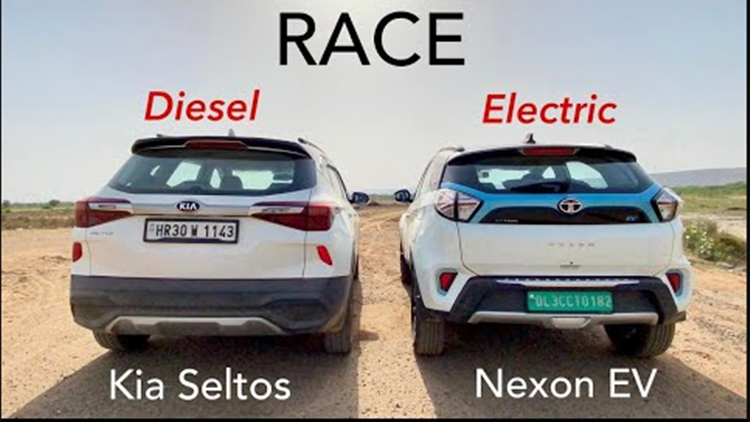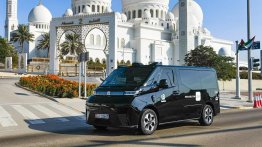If you are a regular reader of IAB, you'd know we simply love drag races. Over time, we have featured several drag races on our websites, mostly between similar cars and SUVs, powered by conventional fuel. This time, we have yet another drag race, but with a twist. It's an electric car vs a diesel car. More precisely, it's the Tata Nexon EV vs the Kia Seltos diesel, going head to head against each other. The Tata Nexon EV is the best selling EV in the country and the Kia Seltos is also one of the best selling compact SUVs in its class. So this should be a pretty interesting race.
But before we go ahead with the race, let's take a look at the specifications. Unlike other drag races, where both cars are powered by an internal combustion engine, and have comparable specs, the two SUVs involved in this drag race here are completely different under the skin. The Kia Seltos, here in its diesel-manual-spec, is powered by a 1.5L four-cylinder turbodiesel engine that produces 115hp and 250Nm of peak torque. Meanwhile, the Tata Nexon EV is powered by a 3 Phase Permanent Magnet Synchronous Motor that produces 129hp and 245Nm of peak torque, drawing power from a 30.2kWh lithium-ion battery. There's no transmission in case of the Nexon EV.

Also Read : Jeep Compass Facelift vs Kia Seltos Drag Race - Unexpected Winner
On paper, the Nexon EV has more power than the Seltos, while the latter has marginal more torque. However, there's a world of a difference on how both SUVs put that power and torque down on the road. The drag race was conducted across two rounds. Unsurprisingly, it was the Tata Nexon EV that came out as the winner in both the rounds, and that's primarily down to the fact of how an EV produces it power and torque. As you can see in the video, the Kia Seltos gets the better start, but the Nexon EV is quick to catch up and then zooms past the Seltos to take victory in both the rounds. So what really happened there?
Thanks to generous torque from the diesel engine, the Seltos gets off the line very well in both the rounds. Meanwhile, the Nexon EV can deliver all 245Nm of torque right from standstill, which overwhelms the grip of the tyres and naturally, there's lots of wheelspin. While the Seltos gets away initially, once the Nexon EV has gained its traction, there's really no stopping it. Not only does it catch up to the Seltos, but it also easily overtakes the diesel-powered SUV to take a comfortable victory. That's the effortlessness with which an EV performs against conventionally fueled vehicles.
However, if this race went on for longer, the Kia Seltos might have been able to save some honor. Incidentally, top-speed of the Nexon EV is limited to 120kph. In fact, acceleration on the Nexon EV actually tails off after 100kph. The Kia Seltos, on the other hand, does not have to worry about either such problems. Moreover, hard acceleration with an EV inevitably has effect on its range, and after a couple of drag races, the Nexon EV was down to just 95 km of range. With limited or no charging infrastructure, this remains one of the biggest challenges of EV owners in the country, which we are hopeful, will be resolved over the next few years.
Stay tuned to IndianAutosBlog.com for more such interesting drag races and other four-wheeler news.
























